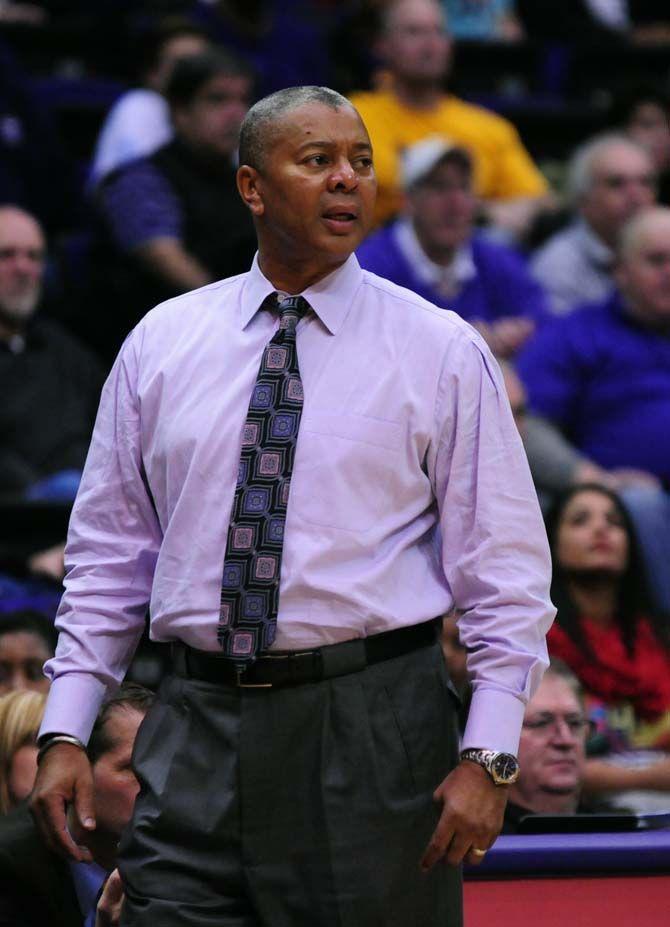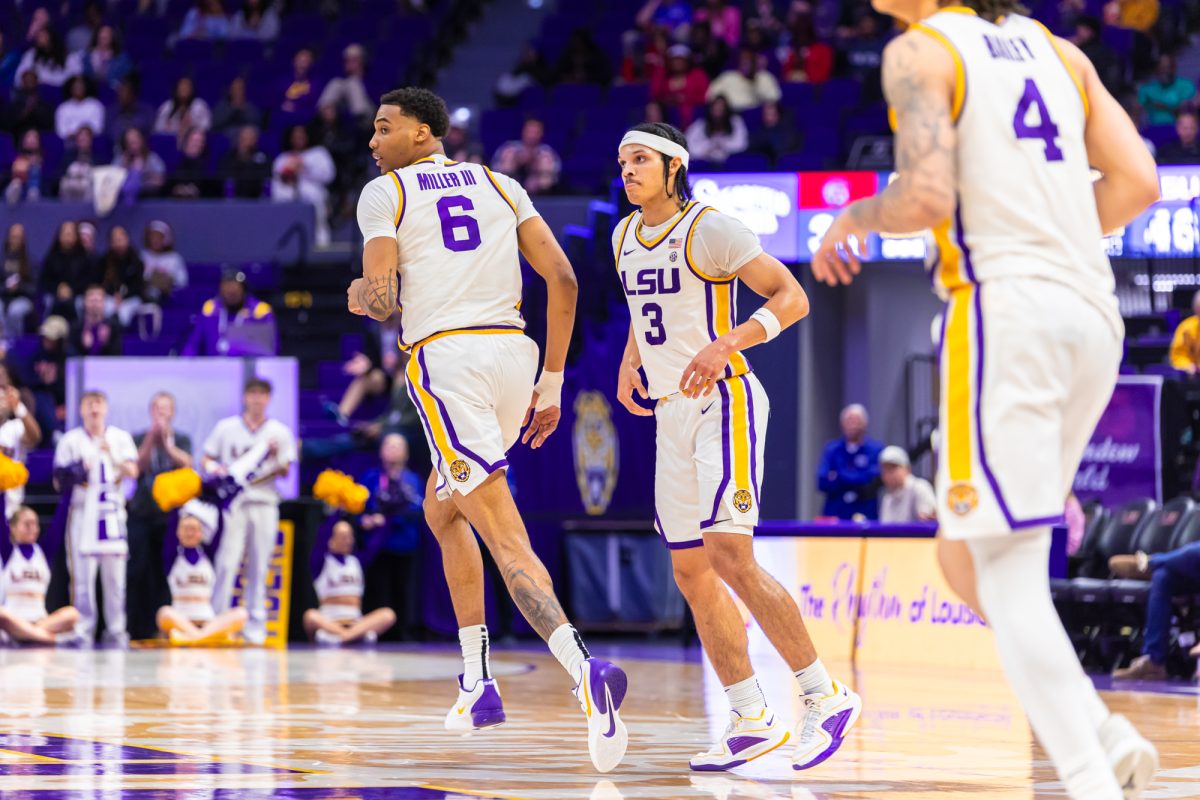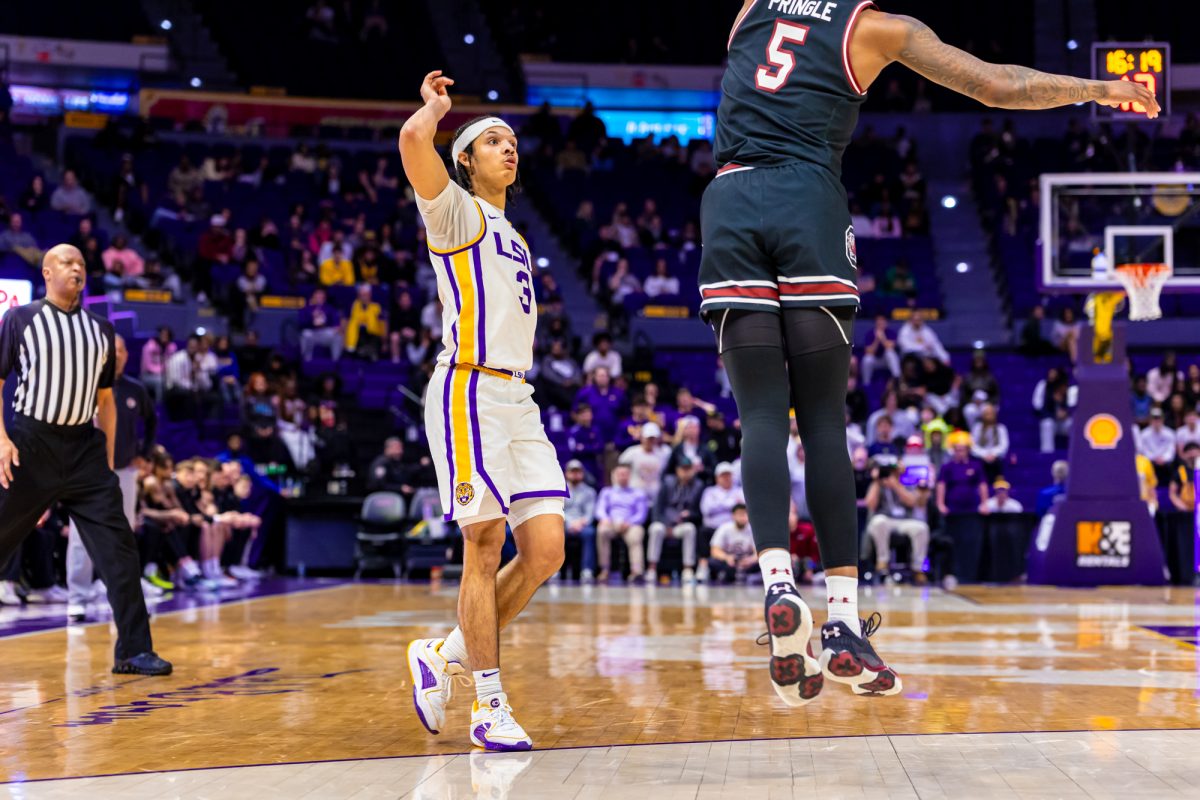LSU men’s basketball coach Johnny Jones is selective in his word choice when speaking with the media.
In a community that embraces LSU football coach Les Miles’ colorful delivery at the podium, Jones’ repetition may appear bland in comparison. He’s ultimately a player’s coach, someone who remains positive and isn’t looking to point fingers in defeat.
But behind closed doors, Jones is the type of coach one would expect of a 20-plus win team.
“I’m always real truthful with [my players] and don’t beat around the bush,” Jones said. “I don’t hide anything from them. You just have to be straightforward with them. They’re appreciative of that because we’re all in this deal together.
“You don’t sit there and tell them they’re doing good when we’re not.”
As the Tigers (22-9, 11-7 Southeastern Conference) enter the SEC Tournament, Jones has his team exactly where it needs to be, and statistics show this shouldn’t be a surprise.
Jones’ 61 wins is the most wins of any LSU basketball coach in his first three years, and he has improved his record with the Tigers each year. What’s more impressive is the rejuvenation of his once-slumping team after two straight losses to bottom-tier SEC clubs in late January and early February.
Even when the Tigers slipped back into their old habits of inconsistency against a .500 Tennessee team on March 4, Jones took his club into Fayetteville, Arkansas, without the services of sophomore forward Jordan Mickey and knocked off the No. 18 Razorbacks, potentially clinching a berth in the NCAA Tournament.
After reaching the Final Four as a player and assistant coach at LSU and taking North Texas to two NCAA Tournaments as a head coach, Jones is on the cusp of his first as the Tigers’ head man.
“I remember it from my freshman year, going to the Final Four and everything that went into it, from the seniors that were on that team to the coaches as well,” Jones said. “The feeling that you have — I want to make sure these guys get that feeling. I’m as excited on this side of it as I was as a player.”
Whether he knows it or cares, fans have been quick to criticize Jones for any number of reasons. If it isn’t time management, it’s his offensive play calling. If it isn’t play calling, it’s his team’s pace of play or lack of consistency from game to game.
While those concerns could be considered valid at one point or another, the end result is more important than the means for a program with only two NCAA Tournament appearances in the last decade.
“When I was being recruited, [Jones] told me he was going to turn the program around,” said sophomore forward Jordan Mickey. “We did pretty good last year, and this year we are doing even better. It’s a sign that he’s turning the program around. He’s getting players in, so I’m glad I did choose here. I’m excited to be a part of it.”
The most important element to Jones’ success is instilling confidence in his key contributors, which is most evident through junior guard Keith Hornsby and sophomore guard Tim Quarterman.
The sharpshooting Hornsby sat out one year after transferring from UNC-Asheville, watching as the Tigers bowed out in the second round of the NIT. His patience paid off as he became the conference leader in total minutes played and is entrusted to take shots at critical moments in any
given game.
Jones expects a lot from Hornsby, the only player on the roster with NCAA Tournament experience, but the coach’s faith in his guard’s ability has remained unwavering.
“[Jones has] told me I’ve been starting out the games really well, but sometimes in the second half I tend to more ‘fit in,’” Hornsby said. “He’s told me to keep being aggressive. Also, within our plays, [he’s said] to just be calm, let the actions take place and have confidence in my passes. When I’ve done that, good things have happened, like he predicted.
“It’s amazing how he can see things unfold before they happen.”
Jones’ trust and decision making extends to his players’ comfort level, and he even called Quarterman into his office before the Tigers’ 73-63 win against Ole Miss.
The dubious Quarterman thought Jones wanted to know if he had gone to class — which he had — but Jones already knew the answer to that question.
Instead, the coach just wanted to talk basketball and pose a question to his energetic guard.
“Who do you want to guard?”
Quarterman picked Ole Miss guard Stefan Moody, the Rebels’ leading scorer, and limited him to a 3-of-16 clip from the field while pouring in a triple-double offensively – doing so with a sore ankle.
For a player who struggled to define his role freshman year and now averages nearly 35 minutes in the last nine games as a starter, Quarterman has made good on Jones’ belief.
“I’m just glad coach Jones still believed in me,” Quarterman said. “He gave me an opportunity to come back and take advantage of an opportunity I didn’t have last season. I had to grow up. I had to learn from other
players.”
Some argue Jones is a better recruiter than he is a coach, but the players he did recruit are peaking at the right time. They’re not playing for themselves and their fan base, they’re playing for their coach.
“To see them have a chance to be that close, it means a great deal when you take a group of young men like that, especially with as inexperienced and as young as we are,” Jones said. “It’s exciting to be that close to possibly fulfilling a dream — one, getting to the NCAA Tournament and then having a chance to succeed and be
successful there. It means a lot.”
You can reach James Bewers on Twitter @JamesBewers_TDR.
LSU men’s basketball coach Jones boasts best three-year start in school history
March 9, 2015
LSU basketball head coach Johnny Jones watches the game on Saturday, Jan. 10, 2015, during the Tigers’ 87-84 win against Georgia in the Pete Maravich Assembly Center.
More to Discover






